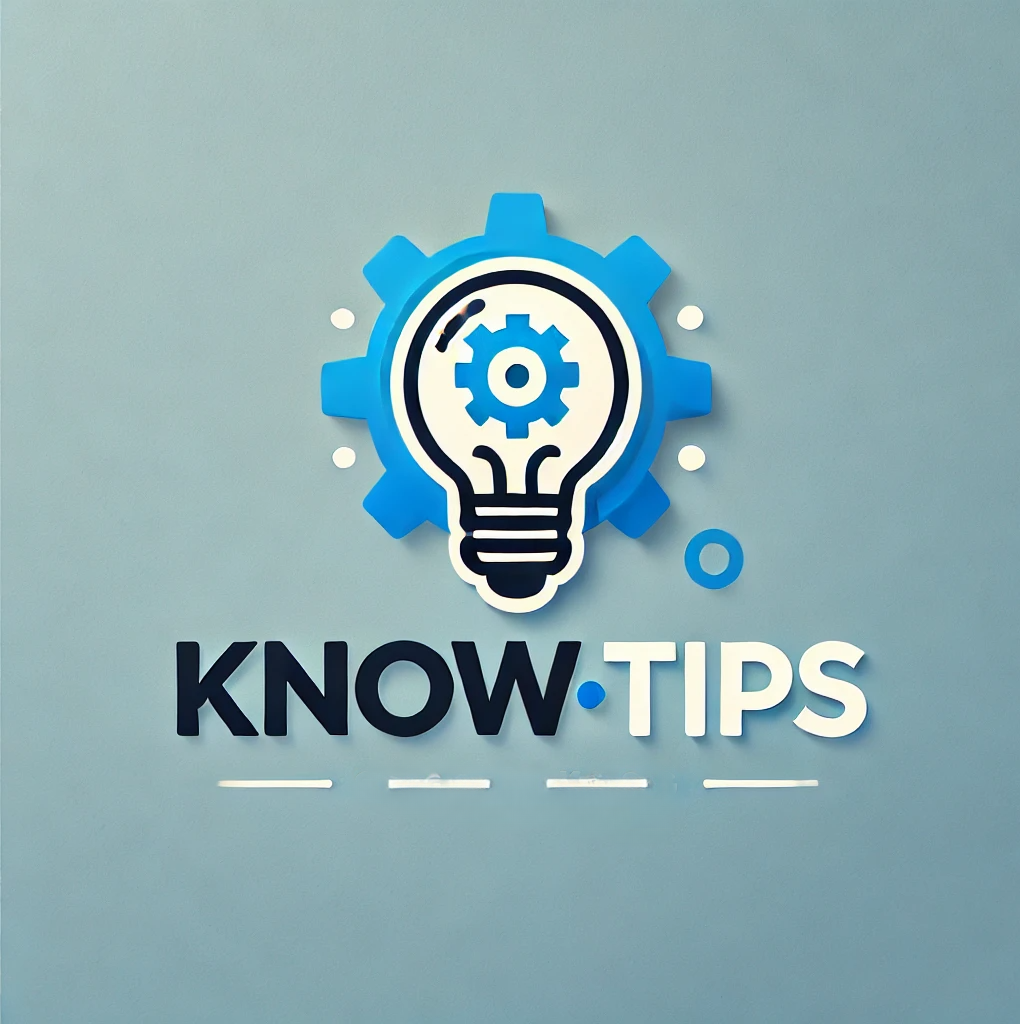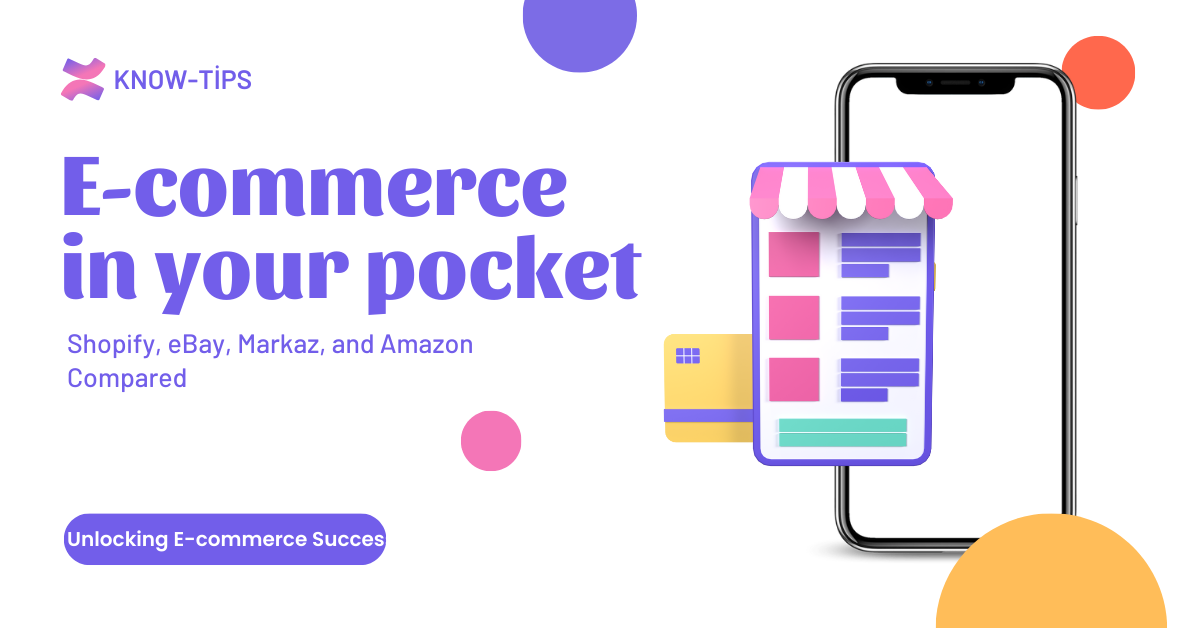Top-Rated E-commerce Platforms 2024: Expert Review
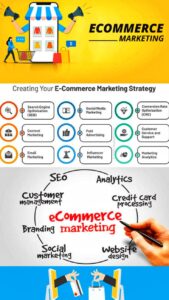
⇒ Introduction to E-commerce:
1. What is E-commerce?
E-commerce, otherwise known as electronic commerce, is when products and services are bought and sold on the internet. The revolution it has brought has made businesses of all sizes able to market to a global audience with little to no overhead cost. With the advent of smartphones and electronic payment systems, e-commerce has really boomed in the last decade. In 2024, e-commerce is still in bloom, and there are even more ways for businesses to reach the global marketplace!
It’s no secret that global e-commerce is a growing market: they expect the e-commerce to hit $8.1 trillion in 2026, as more consumers shop online and are looking for easier and more convenient shopping, as well as a range of options. And consequent to demand surge, these are some of the platforms that are being used for different business model like Shopify, eBay, Markaz and Amazon.
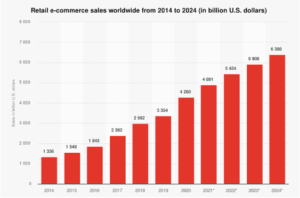
⇒ Major E-commerce Platforms: Overview
1.Shopify:

The Shopify platform is now one of the top online platforms that many small to medium-sized businesses use to build and manage their online store. Since 2024, Shopify has been powering 4 million stores worldwide and features a versatile platform that allows anyone to set up their customized, professional storefronts without having to write code. Shopify comes with an intuitive interface, grants access to plenty of third-party apps, and is suited for businesses looking to go from zero to one thousand in no time at all.
Learn more about Shopify’s features and market share.
2. eBay:
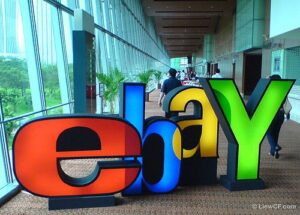
eBay is a global peer-to-peer marketplace that sells new and used items as well as to businesses. It becomes well known for its unique auction system as well as the ‘Buy Now’ feature, which allows instant purchase of the products. eBay is one of the pioneers of e-commerce, presenting millions of users around the world, notably collecting rare items.
More about eBay’s features and its auction system.
3.Amazon:
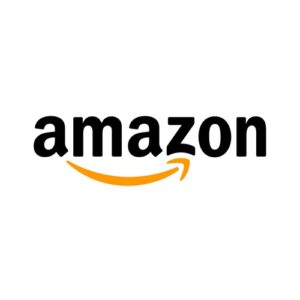
The #1 online marketplace by far is Amazon, which has 200+ million Prime members worldwide. Its third-party sellers’ Kindle Direct Publishing (KDP), which allows third-party sellers to store their eBooks with Amazon and deal with shipping and customer service. This, together with Amazon’s global reach, forms a great combination if you are a business that wants to scale quickly.
Learn more about Amazon’s FBA model.
4. Markaz app (Pakistan)

Markaz is a new platform based in Pakistan that caters to resellers and local businesses. With no spend required upfront, Markaz allows small entrepreneurs to resell products through app. The popularity of such a model, especially in Pakistan, where the general population may not have access to traditional e-commerce portals, has been on the rise.
Read more about how Markaz is empowering local businesses.
⇒ Features of Each Platform;
1.Shopify Features:
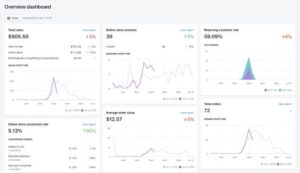
Included in the package is a drag-and-drop website builder, customizable themes and integrated payment processing. It has an App Store that supports third-party integrations, so you can simply add features such as email marketing tools, SEO apps and so on. Besides being applicable in various industries, Shopify also supports businesses as well.
Discover Shopify’s key features and integrations.
2.eBay Features:

eBay offers a range of seller tools, like its listing tool and analytics dashboard. eBay Stores allows sellers to create a branded storefront and see those performance figures through in-depth reports. Advancing search filters and a full feedback system never hurts: eBay allows buyers to search, and it allows buyers and sellers to leave feedback about each other.
Explore eBay’s selling tools and analytics.
3.Amazon Features:
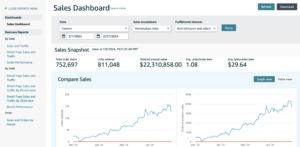
Amazon’s platform is strong, with Fulfillment by Amazon (FBA) being a feature of it, whereby sellers can store their products on Amazon’s warehouses. In addition to that, sellers also have access to their disposal sales reports, advertising tools like pay per click (PPC), performance tracking, and other tools that help them get more visibility on their products. Amazon Prime also offers that faster shipping speed, which benefits Prime eligible products.
Learn about Amazon’s Seller Central and tools.
4.Markaz Features:
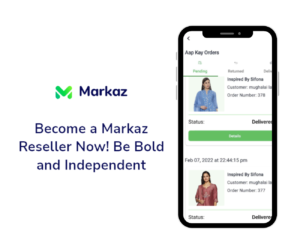
The main focus of Markaz is to provide reseller tools, particularly in Pakistan. It gives users an interface to source from the local suppliers, manage their profits, and resell goods on social media channels like WhatsApp and Facebook for profit. Markaz is designed to enable small businesses with zero upfront investment, leaving minimal risk.
Discover Markaz’s reseller features.
⇒ How to Set Up on Each Platform:
1.Shopify Setup:
Registration on Shopify includes the following:
- Select a theme
- Add products
- Choose a method of payment
- Finalize the store and finally publish the store.
There are three Shopify plans (Basic, Shopify, and Advanced), and each of them have different features depending on your business needs.
Step-by-step guide to setting up Shopify.
2.eBay Setup:
If you want to begin selling on eBay, do following:
- You’ll need to set up an eBay seller account
- Listing your products with good
- High-quality photos
- Choosing between an auction or fixed price
- Listing, as you will.
eBay also provides a number of listing tools to help you to sell as efficiently as possible.
Learn how to set up a seller account on eBay.
3.Amazon Setup:
On Amazon, you can have one or the other, an individual account or a professional account. Initial setups are as follows:
- Completed registering as a seller.
- Setting up product listings and choosing to fulfil with FBA if it happens to be needed.
- With Amazon’s Seller Central dashboard, sellers were able to manage inventory.
- Track performance.
- Run ads.
How to start selling on Amazon.
4.Markaz Setup:
Reselling through Markaz is made a lot simpler.
- Users can sign up
- Check a variety of products offered by the suppliers, and can share the items on their social media handles.
- A markup on the supplier’s price makes a profit.
⇒ Customization Options:
1.Shopify Customization:
Shopify is deeply customizable; users can modify their store the way they please with themes and custom code (HTML & CSS). Dropshipping and email marketing are two popular apps, like Oberlo and Klaviyo, respectively.
Shopify’s customization options explained.
2.eBay Customization:
Through eBay Store subscriptions, eBay sellers gain control over their listings, as well as branding options, but they also need to pay for brand extensions, a branded storefront, and set up favicon and SSL options. Moreover, sellers can add detail photos and item specifics to help with their listing visibility.
How to customize your eBay storefront.
3.Amazon Customization:
While Amazon offers limited customization, sellers can enhance their listings with Enhanced Brand Content (EBC) and detailed product descriptions for registered brands. These features help improve product visibility and conversion rates.
How to use Enhanced Brand Content on Amazon.
4.Markaz Customization:
Markaz focuses on reselling pre-made products, so its little to customize. But resellers now have the ability to customize their product listing and control how they market on social media platforms.
More on Markaz’s customization options.
⇒ Tips for Success on Each Platform:
1.Shopify Tips:
- Focus on SEO: Optimizing product pages, blog posts, and site architecture can help attract organic traffic.
- Use email marketing and paid ads to drive traffic and increase conversions.
2.eBay Tips:
- Manage customer feedback to maintain a high seller rating.
- Optimize listings with keywords and ensure fast shipping to rank higher.
3.Amazon Tips:
- Invest in PPC advertising to gain product visibility.
- Track Best Seller Rank (BSR) and optimize listings accordingly.
4.Markaz Tips:
- Focus on social selling: Utilize WhatsApp and Facebook to reach your audience.
- Offer consistent customer service to encourage repeat purchases.
Reselling tips on Markaz.
⇒ Conclusion:
But if you choose not to build an online store from scratch, there are more than just a few available e-commerce platforms accessible to you, such as Shopify, eBay, Amazon, and Markaz, which provide several tools as well as useable features to aid entrepreneurs in building and customizing and also scaling their businesses. If you want to succeed in the competitive e-commerce space of 2024, you need to choose the right platform, one that fits with your desired outcomes and plays to its strengths.
⇒ FAQs:
- What is Shopify?
Shopify is a leading e-commerce platform that allows individuals and businesses to create online stores to sell products and services. It will have over 4 million active users in 2024.
- How much does Shopify cost?
Shopify offers pricing plans ranging from $39 to $399 per month, depending on the features needed for your store.
- What is eBay used for?
eBay is an online marketplace for both businesses and individuals to buy and sell products through auctions or fixed-price listings.
- What are the benefits of using Amazon for sellers?
Amazon provides access to a large customer base, fulfillment services through Amazon FBA, and powerful advertising tools to promote products.
- What is Markaz, and who uses it?
Markaz is a Pakistan-based e-commerce platform that enables small entrepreneurs to start reselling products without upfront investment. It’s popular for selling locally sourced products.
- How can I optimize my Shopify store for SEO?
Optimize product pages with relevant keywords, use meta descriptions, create high-quality content, and integrate Shopify apps for better SEO performance.
- Is it free to sell on eBay?
While eBay does offer free listings, sellers pay a final value fee (typically around 12.9%) when an item is sold.
- What are Amazon’s selling plans?
Amazon offers an Individual Plan (no monthly fee, but $0.99 per sale) and a Professional Plan ($39.99 per month) for larger sellers with unlimited listings.
- What platforms are supported by Markaz?
Markaz operates on Android, iOS, and Windows, making it accessible across different devices for resellers.
- What’s the difference between Amazon and Shopify?
Amazon is primarily a marketplace, while Shopify is a platform to build your own online store. Shopify offers more control over branding, while Amazon provides a massive built-in audience.
Note:
If you have any questions, then comment on post we will respond as soon as possible.
thank you all to visit our site to get new tips and increase your knowledge. To get new blogs, visit our site daily.
share this to your friends: www.know-tips.com
